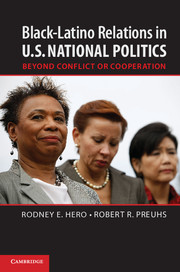Book contents
- Frontmatter
- Contents
- List of Tables and Figures
- Preface
- Acknowledgments
- Abbreviations
- 1 Introduction
- 2 What Previous Research Tells Us about Black-Latino Relations
- 3 Black-Latino Relations in Congressional Testimony and the Legal Arena
- 4 Salience and Congruence in Policy Positions
- 5 Black-Latino Relations in the U.S. House of Representatives
- 6 The Role of Group Interests and Ideology in Cross-Group Support
- 7 Further Explorations of Black-Latino Relations and Policies in National Politics
- 8 Conclusions
- Bibliography
- Index
2 - What Previous Research Tells Us about Black-Latino Relations
Published online by Cambridge University Press: 05 February 2013
- Frontmatter
- Contents
- List of Tables and Figures
- Preface
- Acknowledgments
- Abbreviations
- 1 Introduction
- 2 What Previous Research Tells Us about Black-Latino Relations
- 3 Black-Latino Relations in Congressional Testimony and the Legal Arena
- 4 Salience and Congruence in Policy Positions
- 5 Black-Latino Relations in the U.S. House of Representatives
- 6 The Role of Group Interests and Ideology in Cross-Group Support
- 7 Further Explorations of Black-Latino Relations and Policies in National Politics
- 8 Conclusions
- Bibliography
- Index
Summary
A central question in this book is the nature of black-Latino relations in American national politics. In the evidence we present in later chapters, black-Latino conflict is found to be essentially nonexistent in the arena of national institutions and policy authority; additionally, the evidence regarding national-level elite behavior indicates that intergroup relations are generally marked by “independence” and there is also some indication of comity or cooperation. These findings are more notable when contrasted with the results of several research efforts over the last few decades at the local level, where findings of conflict are not unusual, and signs of tension are also evident (cf. Telles et al. 2011; Nelson and Lavariega Monforti 2005). The purpose of this chapter is to summarize evidence and related theorizing from previous analyses which is relevant, but also stands in contrast to our subsequent detailed examination of national politics. Serving as a “preface” to our later analysis, we describe specific questions that have been studied, show how these studies examine the issue, and identify the forms and variations of intergroup relations. We also consider the causes for the relationships that are claimed since those occur in the urban, local education, and state politics (that is, “subnational”) levels, and in mass attitudes research.
The literature discussed in this chapter is comparative within particular levels and types of governments. That is, in that research, cities are studied individually (in case studies) but are also frequently compared to other cities, school districts are compared to school districts, and states to states. But analyses attempting to make other comparisons – say, cities to states – are not done here because the different jurisdictional spheres and varied policy and geographic/territorial authority of the two types make such comparisons theoretically and practically inappropriate. The governments at the local and state (and national) levels have different, albeit sometimes overlapping, policy responsibilities and draw primarily on different tax bases; furthermore, cities are technically “creatures of the state.” Hence, the absence of research directly comparing these different levels of government is based on a clear recognition that their geographic scope and/or related policy authority makes them incommensurable for many analytical purposes.
- Type
- Chapter
- Information
- Black–Latino Relations in U.S. National PoliticsBeyond Conflict or Cooperation, pp. 28 - 54Publisher: Cambridge University PressPrint publication year: 2013



